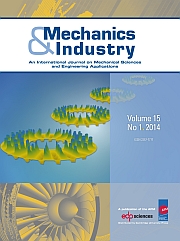Article contents
Multibody modeling of non-planar ball bearings
Published online by Cambridge University Press: 18 December 2013
Abstract
This work presents the dynamic modeling of ball bearing which uses multibody dynamicformalism. Such formalism allows immediate integration of the model in dynamic simulationsof helicopter main gear boxes. Ball bearing is considered non-lubricated in order topredict its behavior in case of lubrication system failure. Rolling contacts are treatedwith the method proposed by Kalker. This approach is based on polynomial approximation ofrelative displacement on the contact ellipse. For low computational cost and without anyspatial discretization, it gives a good estimation of tangential traction and creep. Also,a regularization of the Kalker linear creep theory is proposed. It is used here tofacilitate the global convergence of the Newton iterative process. It is well suited formultibody dynamic simulations which do not need a very fine treatment of rolling contact.A numerical example of a ball bearing under thrust load is presented.
Keywords
- Type
- Research Article
- Information
- Copyright
- © AFM, EDP Sciences 2013
References
- 8
- Cited by


